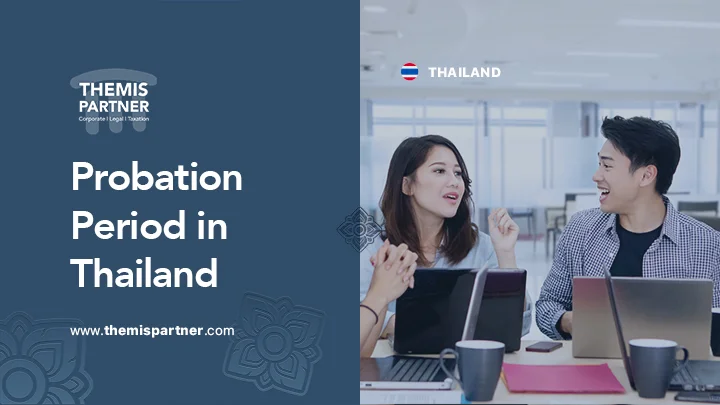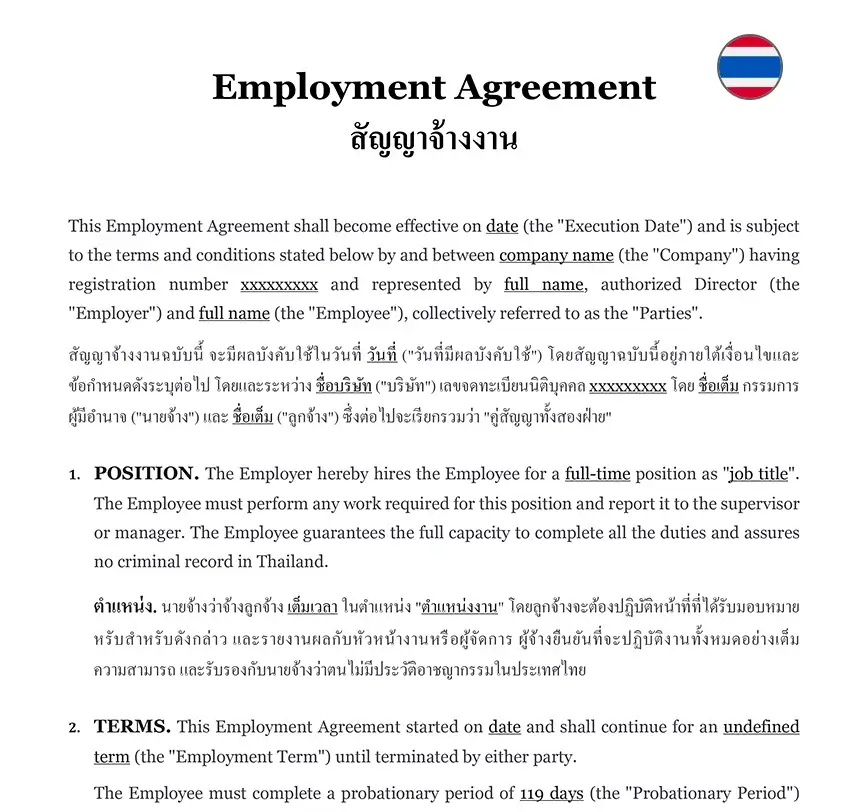Did you know probation period in Thailand typically lasts just 119 days to avoid costly severance obligations?
Navigating this brief but crucial window is about more than timelines: it is a balance of compliance, fair evaluation and protecting your business.

For employers, staying within the boundaries of Thai labor law means more than simply marking the calendar.
It demands clear contracts, documented feedback, and transparent processes, essentials for avoiding legal disputes and building trust with your team from day one.
Key Takeaways
- Set probation at a maximum of 119 days and clearly define terms and evaluation criteria in the employment contract.
- Register all probationary employees with the Social Security Fund from day one to ensure full legal compliance.
- Maintain proper documentation, provide written feedback, and handle extensions or early completions in writing.
- Guarantee all legal rights during probation, including minimum wage, leave, and benefits.
- Terminate or confirm employment lawfully with written notice and complete final pay for transparency and compliance.
Looking to outsource HR & payroll?
Our team handle payroll, HR administration, PEO employment, and full visa and relocation support.
Table of Contents
-
Probation Laws and Compliance in Thailand
-
Setting Probation Terms and Duration
-
Rights and Duties During Probation
-
Evaluating Probation Performance
-
Termination and Post-Probation Steps
-
FAQ: Probation Period in Thailand
-
Conclusion
Probation Laws and Compliance in Thailand
Key Laws on Probation Periods
The Labour Protection Act B.E. 2541 (1998) serves as the foundation for employment rights in Thailand, including those of probationary employees. While probation is not specifically defined in this Act, the practice is widely recognized and embedded in Employment Contracts.
Employers are responsible for several compliance steps during probation:
- Clearly defining probation terms in written contracts
- Registering all employees, including probationers, with the Social Security Fund
- Following wage, leave, and benefits requirements established by law
Contract terms and procedures frequently reference Ministry of Labour guidance.
Required Documents and Procedures
A strong compliance framework relies on accurate documentation at every stage. Essential steps include:
- Drafting written contracts specifying the probation period, assessment criteria, and key terms
- Notifying employees in writing about probationary status from day one
- Maintaining evaluation records and formal feedback for each probationer
Clear documentation is the best defence against disputes and regulatory pitfalls. Well-kept records can be pivotal in demonstrating fairness and legality if disputes reach labour authorities.
To stay current and compliant, reference government sources and update employment policies yearly.
Setting Probation Terms and Duration
Legal Length of Probation in Thailand
Probation period in Thailand usually ranges between 30 and 119 days, with 119 days being the maximum to avoid statutory severance obligations.
Employers commonly set probation below 120 days because, by law, staff employed beyond this limit are entitled to severance pay if terminated (Labour Protection Act B.E. 2541).
Key employer practices include:
- Stating the exact probation period in the employment contract
- Aligning duration with role complexity or specific sector requirements
- Ending probation precisely at 119 days to minimize legal risks
Can Probation Be Extended or Shortened?
Employers may extend or shorten probation, but best practice is to do so transparently and fairly, always in writing.
Steps to adjust probation include:
- Providing clear, written reasons for the extension or early completion
- Formally notifying the employee with documentation
- Ensuring all adjustments comply with employment contract terms and Thai labour law
Extending probation without valid justification or due process could expose employers to legal challenges or claims of unfair treatment.
Rights and Duties During Probation
Employee Rights Under Probation
Employees on probation in Thailand receive the same core rights as regular staff.
These rights include:
- Guaranteed minimum wage by law (per the Labour Protection Act B.E. 2541)
- Overtime pay for applicable roles and work beyond standard hours
- Entitlement to sick leave, annual leave, and statutory public holidays
- Immediate registration with the Social Security Fund for access to health benefits
Foreign nationals receive equivalent foundational protections, but procedures for work permits and social security registration may differ. In regulated sectors like hospitality and healthcare, additional industry-specific rules may also apply.
For a deeper understanding, read our social fund registration guide.
Employer Responsibilities and Authority
Employers retain the right to:
- Set clear job criteria, responsibilities, and targets
- Conduct regular performance assessments and probation evaluations
- Manage onboarding and training from the beginning
Best practices include:
- Communicating expectations and feedback in writing to reduce misunderstandings
- Applying fair criteria and objective assessment standards
- Preventing discrimination or breaches of contract, as required by Thai labour law
Employers and employees both benefit from maintaining documentation of all evaluations, ensuring legal safeguards are met if disputes arise later.
Evaluating Probation Performance
Fair and Objective Evaluation Practices
To ensure a fair probation period in Thailand, set clear, role-specific evaluation criteria right from the start.
Employers should establish structured processes that include:
- Defining measurable performance indicators (e.g., sales targets, client onboarding speed, quality benchmarks)
- Scheduling regular feedback meetings at mid-point and end of probation
- Keeping written records of all evaluations and communications
Many Thai businesses use a 60- or 90-day check-in followed by a final review to promote transparency. For consistency, document each session with checklists detailing attendance, work quality, punctuality and adaptability.
Download the Employee Performance Evaluation Form to document staff performance fairly and compliantly.
Useful Tools and Templates for Assessment
Efficient assessments rely on ready-to-use templates and impartial processes.
Recommended tools include:
- Standardized scorecards or rating rubrics for each job type
- Step-by-step evaluation checklists to prevent reviewer bias
- HR-led training on objective reviews and legal compliance
A strong framework avoids procedural pitfalls and makes each evaluation both fair and actionable. Leveraging standardized tools ensures compliance, protects against disputes and helps integrate new hires into the Thai workforce efficiently.
Termination and Post-Probation Steps
Lawful Termination During Probation
Employers in Thailand can terminate employment during probation, but must follow clear, lawful steps to reduce risk.
Legal requirements include:
- Just cause for dismissal, documented through performance records or conduct issues.
- Written termination notice if outlined in the contract, or immediate notice per company policy.
- No severance pay if employment is terminated before 120 days.
- Payment in lieu of notice is required if statutory notice applies, especially if exceeding 119 days.
A documented process with clear evaluation records and formal termination letters helps prevent labor disputes or wrongful dismissal claims.
Download the Probation Period Termination Letter to end employment legally under Thai labour law.
After Probation: Confirmation or Next Steps
If a probationer passes, employers should:
- Provide written confirmation of permanent employment status.
- Offer updated employment terms, including revised salary or benefits.
- Begin a structured onboarding process for long-term integration.
If unsuccessful, best practices include:
- Providing clear feedback on reasons for non-confirmation.
- Offering outplacement support or references when possible.
- Completing legal documentation and settling final pay.
FAQ: Probation Period in Thailand
Is a probation period legally required in Thailand?
A probation period is not required by law in every Thai employment contract, but it remains the standard practice for most private-sector roles.
Should the probation period be written in the employment contract?
Specify the probation duration and terms in the employment contract for clear legal standing and to prevent disputes.
What employee benefits apply during probation in Thailand?
Probationary employees are entitled to sick leave, annual leave, and social security benefits throughout the 30-119 day standard probation duration.
Do employees on probation receive severance pay?
If employment ends within 119 days, severance pay is typically not required. However, a single day over 120 days of employment means statutory severance applies.
Are there special probation rules for foreign employees?
Probation terms can be adjusted for foreign employees to meet work permit compliance, but baseline legal protections apply universally. Always review with legal counsel for non-Thai hires.
Conclusion
Start by reviewing your employment contracts, updating documentation practices and standardizing your probation evaluations today. Set clear assessment criteria, maintain transparent communication and keep thorough records for every decision.
If you want expert support in designing compliant probation policies or require tailored legal advice, contact us. Themis Partner streamlines your HR processes and safeguard your business with practical, compliant solutions.


